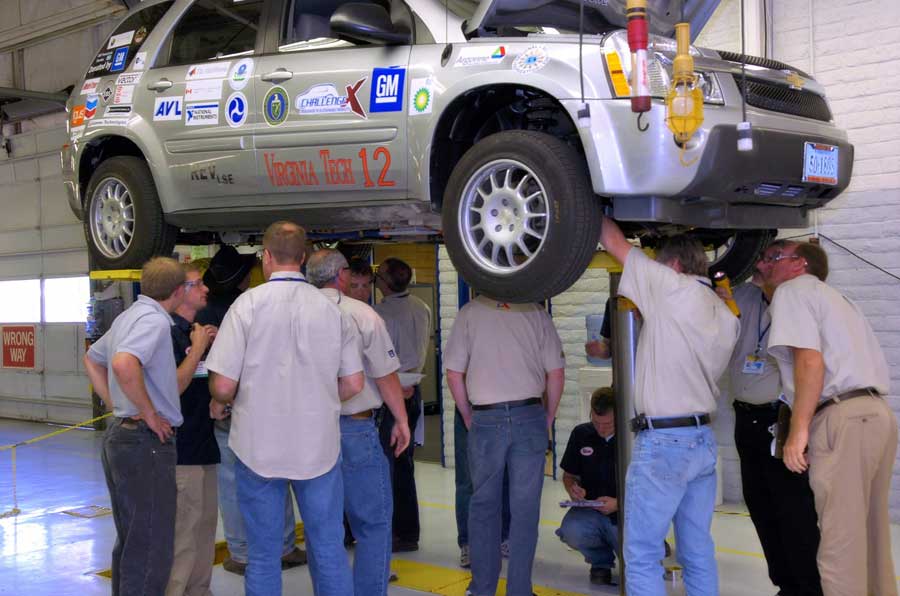Engineering students win Challenge X competition with ethanol-powered SUV

With a Chevrolet Equinox SUV they re-engineered into an ethanol-powered hybrid, the Virginia Tech Hybrid Electric Vehicle Team (HEVT) took top honors during the second-year competition of Challenge X: Crossover to Sustainable Mobility, held at the General Motors (GM) Mesa Desert Proving Grounds in Arizona.
The HEVT is among 17 university teams selected by the U.S. Department of Energy (DOE) and GM to compete in the three-year Challenge X, a national competition that encourages engineering students to help develop advanced propulsion technology for the next generation of energy-efficient, low-emissions vehicles.
In addition to placing best overall, the Virginia Tech team won in three categories, reported mechanical engineering graduate student Steven Boyd, HEVT’s leader. “We took first place in best written technical report, lowest emissions, and lowest petroleum consumption,” Boyd said. “We achieved a 75 percent petroleum reduction from the standard Equinox consumption.”
The HEVT engineering students, most of them undergraduates, modified the Equinox using a Saab 2-liter E85 engine that runs on 85 percent ethanol and 15 percent gasoline. The team integrated the Saab engine into the Equinox with a split parallel hybrid electric drive.
“With the E85 engine and two battery-powered electric motors, we can use either to turn the wheels — or we can use them together,” said Doug Nelson, HEVT faculty adviser and professor of mechanical engineering at Virginia Tech. “The motors also can be used as a generator to absorb energy from the engine and recharge the batteries.”
Ethanol is a renewable fuel typically distilled from corn. In addition to achieving the goal of reducing petroleum consumption, the E85 fuel mixture produces fewer overall greenhouse gas emissions.
“It helps to have the 15 percent gasoline in the fuel for cold starts,” Nelson added. “From the beginning of the competition, our goal has been to reduce the petroleum consumption of the Equinox by as much as 80 percent.”
“Developing the advanced technologies that reduce U.S. dependence on imported oil is critical to the future prosperity of our country,” said Ed Wall, program manager for the FreedomCAR and Vehicle Technologies Office of DOE’s Office of Energy Efficiency and Renewable Energy.
To succeed in Challenge X, the Virginia Tech team had to produce a fuel-efficient, low-emissions Equinox that also retains all of its original performance and utility factors, such as fully operating air conditioning, cargo space and acceleration performance.
“Designs like our Equinox hybrid demonstrate that alternative fuels and advanced propulsion technologies can increase fuel economy and reduce emissions without sacrificing vehicle performance or utility,” Boyd said.
The HEVT members are students from the departments of mechanical engineering, electrical and computer engineering, and computer science in the College of Engineering
During this second year of the competition, the vehicles re-engineered by the HEVT and other teams were judged on design, fuel economy, performance and a number of other factors. After this event, the teams will have another year to refine their entries for the final competition event and judging in June 2007.
“These students are working on the same challenges that our GM engineers continually work on every day — high-efficiency, high performance vehicles that consume less fuel and produce fewer emissions from the well to the wheel,” said Dan Hancock, vice president of GM Powertrain Engineering. “This hands-on learning is providing them the necessary skills to embark on a career in engineering with a competitive advantage.”
DOE and GM gave each team chosen to participate in Challenge X an Equinox and $10,000 seed money, as well as up to $25,000 in automotive parts.
The other teams competing in Challenge X are from Michigan Technological University, Mississippi State University, Pennsylvania State University, Rose-Hulman Institute of Technology, San Diego State University, Texas Tech University, Ohio State University, University of Akron, University of California-Davis, University of Michigan, University of Tennessee, University of Texas at Austin, University of Tulsa, University of Waterloo, University of Wisconsin-Madison, and West Virginia University.
For more information visit the Challange X website.
The College of Engineering at Virginia Tech is internationally recognized for its excellence in 14 engineering disciplines and computer science. The college’s 5,500 undergraduates benefit from an innovative curriculum that provides a “hands-on, minds-on” approach to engineering education, complementing classroom instruction with two unique design-and-build facilities and a strong Cooperative Education Program. With more than 50 research centers and numerous laboratories, the college offers its 1,800 graduate students opportunities in advanced fields of study such as biomedical engineering, state-of-the-art microelectronics, and nanotechnology.




